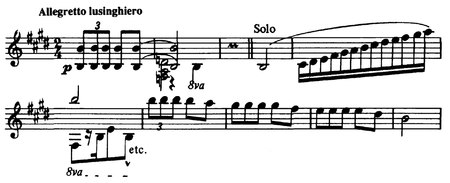Havanaise (Saint-Saëns)
This article needs additional citations for verification. (June 2013) |
The Havanaise in E major (French: Havanaise en mi majeur), Op. 83, is a composition for violin and orchestra based on the habanera rhythm, written in 1887 by French composer, Camille Saint-Saëns for Cuban violinist Rafael Díaz Albertini.[1][2] At the January 7, 1894 orchestral premiere in Paris, the violin was played instead by Martin Pierre Marsick.[3] It is one of the standards of the classical concertante repertoire.
Structure
[edit]The composition consists of a single multi-tempo movement marked Allegretto lusinghiero – Allegro – Tempo primo – Allegretto – Allegro non troppo – Più Allegro – Allegretto – Lento and lasts around ten minutes in performance.
In popular culture
[edit]A minor variation on "Havanaise", as well as the original piece, make up the main theme of the film The Ninth Gate.[4] A brief segment is played many times on the soundtrack of Rainer Fassbinder's film Effi Briest.[citation needed] The initial phrase also supplies the melody to the popular song Sugartime by Charles Phillips and Odis Echols.[citation needed]
References
[edit]- Notes
- ^ (Roeder 2003, p. 288)
- ^ (Rosman 2000)
- ^ Havanaise, Op.83 / Camille Saint-Saëns [notated music] The Library of Congress
- ^ "The Ninth Gate (1999) - Soundtracks". IMDb. Retrieved 22 September 2016.
- Sources
- Roeder, Michael Thomas (2003). A History of the Concerto. Amadeus Press. ISBN 0931340616.
- Rosman, Carl (2000). Liner Notes to Eloquence 4666822, The Best of Saint-Saëns. Universal Music Group.
External links
[edit]- Havanaise, Op.83 (Saint-Saëns, Camille): Scores at the International Music Score Library Project
- "Camille Saint-Saëns (1835-1921): Havanaise in E major for Violin and Orchestra Op. 83. (1887)". Portobello Orchestra. Retrieved 22 September 2016.
- "Program Notes - November 28, 2010". Derwent Symphony Orchestra. 2010. Retrieved 22 September 2016.
- Anderson, Don (2006). "Program Notes - Symphonic Dances". Rochester Philharmonic Orchestra. Retrieved 22 September 2016.
- Mack, Linda (1999). "Carla Trynchuk, violin; Carmen Roberts, piano December, 1999 Concert Tour to India". Retrieved 22 September 2016.
- "Havanaise, Op. 83". YouTube. 21 June 2009. Archived from the original on 2021-12-21. Retrieved 22 September 2016. Saint-Saëns, Havanaise, Op. 83. Performed by Mohamed Harb and the Cairo Symphony Orchestra.
- "Havanaise, Op. 83". YouTube. 11 December 2014. Archived from the original on 2021-12-21. Retrieved 23 February 2017. Saint-Saëns, Havanaise, Op. 83. Performed by Liviu Prunaru and an unnamed pianist.

